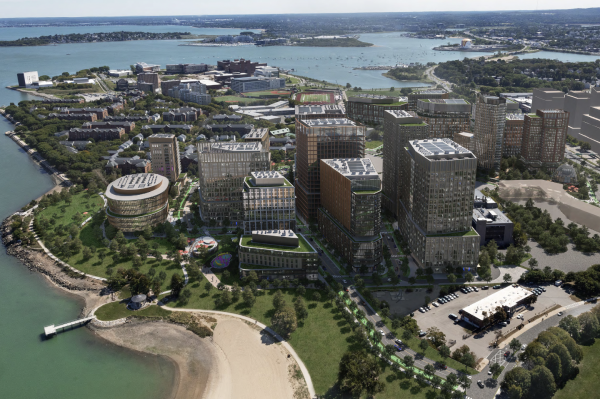September 14, 2023

Rendering of Dorchester Bay City. (Image via Accordia Partners)
The board of the Boston Planning and Development Agency (BPDA) signed off on plans for the $5 billion transformation of several Columbia Point parcels known as “Dorchester Bay City.”
The massive project spans 36.26 acres, bounded by public property, including a shoreline owned by the state’s Department of Conservation and Recreation (DCR), property owned by the State Police, and Morrissey Boulevard. The UMass Building Authority owns a significant chunk of the parcels, having bought and razed the former Bayside Expo Center. Much of the area is now surface parking lots.
The project also includes 2 Morrissey Boulevard, where Santander Bank has offices, and 180 Mt. Vernon Street, which is owned by an affiliate of the Boston Teachers Union.
According to staff memo to the BPDA board, the project is set to create thousands of jobs during the build-out, and between 13,000 and 17,000 permanent jobs in a “variety of industry sectors and at varying skill and education levels.”
The approval was for the project’s master plan, and the developers will seek sign-offs for individual buildings. Once built, it could send more than $78 million in net new tax revenues into city coffers.
Put together by development company Accordia Partners, “Dorchester Bay City” will be a short walk from JFK/UMass Station, a MBTA transit hub that serves the Red Line, three commuter rail lines and multiple bus lines, as well as shuttles to the John F. Kennedy Presidential Library, the Edward Kennedy Institute for the US Senate, and private service to the city’s Longwood Medical Area.
“The final master plan for Dorchester Bay City is a clear reflection of the extensive feedback we received from multiple community organizations, residents, and business owners throughout a comprehensive, three-and-a-half year design, planning, city and state public agency collaboration, and community engagement process," said Kirk Sykes and Richard Galvin, the developers behind Accordia Partners.
The developers hope to break ground next year, possibly spring or summer.
Twenty-one buildings, spanning 6.1 million square feet, will contain a mix of office, labs, residences, retail, restaurants, and community space, according to the proposal. Most will have underground parking.
The project promises to create 8.3 acres of new open space, plant 1,000 new trees and set up a new street system that welcomes pedestrians and bicyclists. Five acres of open space are set to be built during the project’s first phase. Project proponents have agreed to contribute $23 million to an escrow account to benefit neighboring Moakley Park.
Separately, the street system will be built one foot above the minimum sea-level rise elevation. A raised ridge will aim to protect the area, which abuts Boston Harbor, from flooding and storms.
"Since engaging with Accordia Partners, our goal has been to maximize the positive impacts on residents of the neighborhood and the students of UMass Boston," said Marty Meehan, president of the UMass system. "Dorchester Bay City will place new internship and job opportunities right next to one of the nation’s most dynamic and diverse student bodies, empowering these students who represent the future of Boston."
Roughly 1,950 residential apartments are part of the proposal. Twenty percent, or 391 units, will be designated as affordable. The developers have also pledged $10 million to the Massachusetts Affordable Housing Alliance (MAHA), a nonprofit seeking to help first-time homebuyers and first-generation immigrants.
Proponents say the project is also expected to spark improvements to both the area’s roadways, as well as the weathered-looking JFK/UMass Station and the hated rotary known as Kosciusko Circle.
"Tonight’s approval we hope is a catalyst for public agencies at all levels of government to come together around a cohesive strategy for this critical part of the waterfront that gives clear coordinated directives to the developer and is executed with urgency," said Kathy Abbott, head of the advocacy group Boston Harbor Now. "Doing so will not only benefit this project but also serve as an example of the public-private partnerships we will need to address climate resilience throughout Boston Harbor.”


